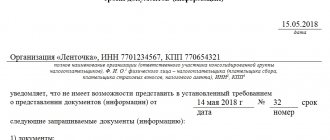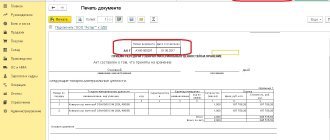During its work, any business entity (individual entrepreneur or LLC) acquires a huge number of documents: registration, accounting, reporting, personnel, permits, supporting and confirming documents. And although this is the 21st century, and electronic document management has long been integrated into business practice, documents in paper format are still an irreplaceable value. The shelf life of some of them is 75 years, as they say, manuscripts do not burn.
We are, of course, not concerned about the historical value of the organization’s documents, but about the fact that the lack of the necessary papers, especially for accounting and personnel, can create difficulties when passing inspections and lead to financial sanctions, in other words, fines. To avoid financial losses, we advise you to check the complete set of all necessary documents from time to time or entrust this check to specialists:
Free business audit
The obligation to collect and store documents of an organization is established by Law No. 125-FZ of October 22, 2004 “On Archival Affairs in the Russian Federation.” According to it, organizations and individual entrepreneurs are obliged to ensure the safety of archival documents, including personnel documents. The list of archival documents is given in the Order of the Federal Archive of the Russian Federation dated December 20, 2022 N 236, it consists of 12 sections and contains 657 items.
Not all of them are related to entrepreneurial activity, so we suggest that you check your documentary baggage with the necessary minimum that organizations and individual entrepreneurs must have.
Registration documents of organizations and individual entrepreneurs
Let's start with the documents with which, in fact, the life of a legal entity begins or the acquisition of individual entrepreneur status by an individual. The list of registration documents for an organization is noticeably larger than for an individual entrepreneur:
- Charter of a limited liability company. To date, this is the only constituent document for an LLC. If changes have been made to the charter, it is advisable to store its previous editions with the note “invalid due to the adoption of a new edition of the charter dated ___.”
- Minutes of the general meeting of founders or the decision of the sole participant to create an LLC. Everything is clear here - this document is an expression of the will of the founders to create a legal entity.
- List of LLC participants. The list must contain current information about each participant (passport data of an individual or organization data), the size and value of each participant’s share, information about its payment. If there are shares owned by the company itself, then information about them is also indicated.
- Certificate of state registration of a legal entity or individual entrepreneur (issued until 2022).
- Certificate of registration with the tax authority (for individual entrepreneurs and LLCs).
- Entry sheet in the Unified State Register of Legal Entities (for LLC) or in the Unified State Register of Individual Entrepreneurs (for individual entrepreneurs). As for extracts from the Unified State Register of Legal Entities (USRIP), there is no need to store them. Usually a bank, notary, counterparties, etc. They request an extract that is no more than a month old, so if necessary, you need to get it again each time.
- Letter with information about statistics codes (for individual entrepreneurs and LLCs). You can obtain this information without contacting the statistical authorities personally, but through a form on the official website of Rosstat. You can find your statistics codes with our help. Just print a page from the site with your codes. Banks also accept such a document, but if you wish, you can also receive an official document with the seal of regional statistical authorities.
Liability for failure to provide documents due to damage
If an entrepreneur cannot provide the documents requested by the tax office and this happens more than twice, administrative penalties may be applied to you. The minimum fine is at least 10,000 rubles.
Important! If documents are lost, they must be restored. If this can be requested from counterparties, then ask again, explaining the reason and writing an official request. At least there will be confirmation that you applied for duplicates.
But if the accounting documents were lost due to theft, or as a result of natural disasters - fire, flood, flooding of the premises. then the situation becomes more complicated. To do this, you need to conduct an investigation, indicating in detail the reasons for what happened. Depending on the document, a service is assigned to conduct the investigation. After which an act is drawn up and submitted to the tax office as confirmation.
Registration documents are requested from the Federal Tax Service upon application for each document, and you will also have to pay a state fee of 300 rubles.
Important! There is no point in storing documents beyond the period established by law; it is better to dispose of them using special equipment or burn them, but make sure in advance that these documents are already subject to destruction.
Thus, we can conclude that documents must be stored. And it is better to store it in a specially designated place, for example, in a fireproof cabinet for safety. And also systematize them to make it easier to navigate, collect them into folders and sign each one. After all, when the papers are in order, it is easier to work and provide data for inspections.
Documents of the organization confirming its legal address
When opening a bank account, the bank will require from the client organization “information about the presence or absence at its location of a legal entity and its permanent management body.” The following documents (optional) can serve as confirmation of the organization’s legal address:
- Certificate of ownership of the premises in which the LLC is located (if the owner is the founder);
- The lease agreement and the acceptance and transfer certificate of the premises, as well as a copy of the certificate of ownership of the premises, certified by the lessor;
- The owner’s consent to register an LLC at the home address and a copy of the certificate of ownership of the premises.
Such documents are also requested by tax authorities (during the initial registration of an LLC and subsequent changes to the Unified State Register of Legal Entities) and licensing authorities. For individual entrepreneurs, there are no special documents confirming his address. A copy of the registration in the passport is enough.
Permitting documents of organizations and individual entrepreneurs for certain types of activities
This refers to those types of activities that require additional documents from government services:
- Licenses for licensed types of activities;
- SRO approvals (for construction companies);
- Confirmation that you have submitted a notice of commencement of activity (in the cases specified in Article 8 of Law No. 294-FZ of December 26, 2008);
- Permits from the SES and the State Fire Service (for shops, catering establishments and hotels);
- Certificates issued for your products or services, etc.
What documentation is kept after the liquidation of an individual entrepreneur?
In the process of carrying out the commercial activities of an individual entrepreneur, quite a lot of documents of a different nature accumulate - certificates, calculations, checks, reports and other papers with incoming and outgoing information.
At the same time, some business documentation is subject to long-term storage, according to Article 17 of Federal Law No. 125 of 2004 on October 22 (specific terms are indicated in Russian legislation). When an individual entrepreneur operates, old papers are replaced with new ones over time, but what to do if the individual entrepreneur is officially closed?
Regardless of the tax regime, even if an entrepreneur works alone (that is, without hiring employees), an individual deals with a large amount of documentation every day. After the closure of the individual entrepreneur, the documents listed below must be retained:
- administrative and economic;
- labor;
- accounting;
- personnel;
- administrative;
- etc.
The obligation to preserve some of these papers is assigned not only to legal entities, but also to individuals. The main such documents include:
- book of accounting of expenses and income (otherwise KUDIR), which is necessary to fill out when using a simplified taxation system (on UTII, for example, it is usually not necessary to maintain it);
- cash book and cash documents;
- documentary confirmation and support of each operation and transaction carried out by the entrepreneur;
- personnel documents (registration cards, employee statements, orders, etc.);
- documents on cash register equipment (cash register passport, service agreement, cashier’s journal, etc.);
- tax accounting (acts of reconciliation with the Federal Tax Service, invoices, tax returns, etc.).
Most of the papers described above relate to primary documentation. Primary documents are documents confirming the completion of any transaction (for example, the sale of goods, payment of wages to an employee, provision of services to clients, etc.). The main primary documentation of individual entrepreneurs includes:
- cash and sales receipts;
- contracts;
- acts (for example, provision of services);
- orders, time sheets, receipts;
- invoice or strict reporting form;
- invoices (when shipping goods);
- receipts;
- invoice;
- etc.
Interesting article: Closing an LLC with two founders.
Why do you need to store documents after the liquidation of an individual entrepreneur?
Despite the closure of the individual entrepreneur, the documentation belonging to it must be stored in accordance with the law. This is required for actual confirmation of transactions of any nature during the activities of the entrepreneur. Even if the calculation of tax contributions does not depend on the expenses of an individual, the documents must be kept in the archive within the specified time frame.
These papers may be needed in the future when conducting an audit by the tax authority. According to Article 93 of the Tax Code of the Russian Federation, the taxpayer, who is also a former entrepreneur, is obliged to provide the Federal Tax Service employee during the inspection with the entire list of documentation that will be required in the process.
In accordance with paragraph 8 of the first part of Article 23 of the Tax Code of the Russian Federation, this documentation must be stored for a minimum period of 4 years from the date of closure of the individual entrepreneur. The absence of these papers or failure to maintain them in proper condition may cause a controversial situation to arise and the imposition of fines, which are established by the Code of Administrative Offenses of the Russian Federation and Article 120 of the Tax Code of the Russian Federation.
It should also be noted that the inspector has the right to request archival documents without conducting an inspection if there is a justified need for the tax authority to obtain information about a specific transaction.
Closing an individual entrepreneur step by step instructions.
If you want to know how to withdraw money from an individual entrepreneur’s account, read this article.
How is the procedure for registering an individual entrepreneur with Rosstat https://urmozg.ru/biznes/registraciya-ip-v-rosstat/.
Accounting and reporting documents of organizations and individual entrepreneurs
Accounting and reporting can be accounting and tax. You can find out how one differs from the other in this article. Here we will limit ourselves to the fact that accounting is mandatory only for organizations, and tax accounting is carried out by all taxpayers (including LLCs and individual entrepreneurs). Based on this, the list of documents of the organization is much more significant than that of an individual entrepreneur, due to the financial statements.
The organization's accounting documents include:
- Accounting registers (general ledger, order journals, memorial orders, account transaction journals, turnover and accumulative statements, accounting books, inventory lists, etc.);
- Accounting statements (balance sheets, profit and loss statements, explanatory notes);
- Working chart of accounts;
- Accounting policy;
- Correspondence on accounting issues.
Documents related to tax accounting (which are maintained by both organizations and individual entrepreneurs) include:
- Tax returns;
- Books of accounting of income and expenses;
- Invoices;
- Purchase books and sales books;
- Documents confirming the tax loss, the amount of which has been carried forward to future periods;
- Acts of reconciliation with the Federal Tax Service and certificates of the status of settlements with the budget.
Primary documents record the fact of business transactions and are the basis for accounting and tax accounting:
- Cash documents and books;
- Bank documents;
- Warrants, timesheets;
- Invoices;
- Expense reports;
- Acts on acceptance and delivery of property and services;
- Acts on write-off of inventory items;
- Receipts, etc.
Agreements and documents confirming their execution:
- Treaties, agreements, contracts, invoice agreements;
- Protocols of disagreements under contracts;
- Correspondence, calculations, certificates, conclusions to contracts and agreements;
- Transaction passport;
- Liability agreements;
- Correspondence regarding accounts receivable/payable;
- Documents on acceptance of completed work (acts, certificates, invoices).
Documents on cash register equipment:
- Cash register passport;
- Cash register registration card;
- Journal of the cashier of the operator;
- Service agreement with the service center;
- Used control tapes;
- Fiscal memory drives, etc.
What to do if documents are lost or damaged
Working situations at a company vary, so it is possible that some documents will be lost. In this case, a report on the loss or damage of files/folders is drawn up, which should also be stored separately. Loss and damage to documents can occur due to independent reasons, for example, due to a fire or flooding of the premises.
Typically, the company's management stores separate electronic copies of files and data in case of unforeseen situations.
Any information, due to the loss of papers or due to the expiration of the data storage period, can be replenished using other documents. For example, if you lose personal accounts that have been stored for 75 years, you can use pay slips with a 5-year retention period. Employee orders will replace copies of these documents.
If documents are damaged, a certificate is written with a list and designation of the type of lost document, the period of its preparation, and the reason for the loss in accordance with the storage period of the individual entrepreneur’s documents.
Storage periods for organizational and individual documents
Typically, the storage of documents is carried out by an accountant, human resources specialist, lawyer, and secretary. It’s good when there are several employees, and you can entrust one of them with maintaining and storing all this documentation.
And yet, even if the business is small, and the owner does not have time to devote a lot of time to this issue, it is necessary to think about the safety of documents. Here are the storage periods for the main groups of organizational and individual documents (see the List for the full list):
| DOCUMENTATION | STORAGE LIFE |
| Registration documents | constantly |
| Licenses and certificates of conformity | constantly |
| Annual financial statements | constantly |
| Accounting quarterly reporting | 5 years |
| Monthly accounting reports | 1 year |
| Accounting registers, working chart of accounts, accounting policies, correspondence on accounting issues | 5 years |
| Primary accounting documents, books and journals | 5 years |
| Accounting and tax accounting data for the calculation and payment of taxes, documents confirming income and expenses, as well as payment (withholding) of taxes | 4 years |
| Tax returns | 5 years |
| KUDiR for simplified tax system | constantly |
| Annual pay slips to the Social Insurance Fund | constantly |
| Quarterly payslips in the Social Insurance Fund | 5 years |
| Declarations and calculations for insurance contributions for pension insurance | 5 years |
| Agreements and documents related to them (except for leasing and collateral) | 5 years |
| Documents related to CCP | 5 years |
| Occupational safety documents | 5 years |
| Employment contracts | 75 years old |
| Personal files of the organization's leaders | constantly |
| Personal files of employees | 75 years old |
| Personal cards of employees | 75 years old |
| Documents of persons not hired (forms, applications, resumes) | 3 years |
| Original personal documents of employees (work books, diplomas, certificates) | on demand, and unclaimed - 75 years |
| Books, magazines, personnel records cards | 75 years old |
Storage for the tax office
During desk or field audits, the tax office may request a number of documents from an individual entrepreneur, for example: a book of income and expenses, a vacation log, contracts with customers and suppliers.
The Federal Tax Service may also request individual cards for calculating insurance premiums.
| Documents that may be requested | Shelf life | From what date is the term counted? |
| Declarations, tax registers, for example, according to the calculation of UTII, USN 6-NDFL, 2-NDFL, “primary”, reconciliation reports with the Federal Tax Service | 5 years | The period for registers, primary documentation and acts is counted from the date when the period for which the individual entrepreneur compiled the document ended. For example, keep the register for calculating UTII for the fourth quarter of 2022 until the end of 2022 - the period begins on January 1, 2022. |
| 4 years | Determine the deadlines for declarations from January 1 of the year following the one in which the reports were submitted (letter of the Ministry of Finance dated July 19, 2017 No. 03-07-11/45829). For example, an individual entrepreneur submitted a declaration under the simplified tax system for 2016 on April 21, 2022. Count the period from January 1, 2022 to December 31, 2022. | |
| Accounting books according to the simplified tax system and patent | 4 years or 11 years | Because The book is needed to draw up and substantiate the declaration, so it should be kept for 4 years. Taxpayers can carry forward losses from previous years or submit an adjustment for any period, so it is advisable to keep it for 11 years. |
| Individual cards for calculating contributions | 6 years | From January 1 of the year following the one for which the individual entrepreneur compiled the card. |
| Insurance premium reports | Constantly if the report is for a year, and 5 years - according to quarterly forms | From January 1 of the year following the one in which the report was compiled. For example, an individual entrepreneur accountant will fill out the ERSV for 9 months of 2022 on October 10. The deadline is counted from January 1, 2022. It will end on December 31, 2022. |
| Documents confirming the purchase and creation of depreciable property (agreements, acceptance certificates) | 5 years | From January 1 of the year following the one in which the individual entrepreneur fully depreciated the fixed asset. For example, an individual entrepreneur built a building in July 2022. Service life - 12 years. The individual entrepreneur will finish depreciating the building in July 2028. Then the document storage period will begin on January 1, 2029 and end on December 31, 2033. |
| Contracts and agreements on transactions | 5 years | From the date on which the contract or agreement ceases to be in effect. |
Where to store documents of the organization and individual entrepreneurs?
If there are few documents, then the easiest way is to create your own archive - store them in a safe (fireproof cabinet) or allocate a separate room for the archive. The law does not provide specific requirements for the design of the archive; the main thing is that it fulfill its function of collecting and storing documents.
Documents of the last three years, as well as those that are constantly required in work (most often, registration) constitute the so-called operational archive, therefore they are not stored for long-term storage. Documents stored for no more than five years, upon expiration of the storage period, must be destroyed by burning or cutting in a shredder.
Other documents with a shelf life of more than five years must be deposited. To do this, they are filed in volumes with no more than 250 sheets in one volume. Each sheet of the volume is numbered, and an internal inventory and cover are drawn up. Documents can also be transferred for safekeeping to specialized archival organizations, but this makes sense if there are a large number of them.
What happens if the company does not store documents?
Individuals who refuse to store documents, or do so incorrectly, commit an administrative violation and face a fine (from Article 13.20 of the Code of Administrative Offenses of the Russian Federation to Article 5.27 of the Code of Administrative Offenses of the Russian Federation).
Depending on the type of document, its storage period varies from 5 years to 75 years.
The short storage period for documents lasts no more than 10 years. This is the bulk of the IP documentation. During this time, it accumulates in large volumes, so it is impossible to do without special preparation of documents for archiving.
When checking the fact of storage of all papers, the regulatory authority takes into account both the location and conditions of storage of folders and files.
Responsibility for the safety of documents of the organization and individual entrepreneurs
It is necessary to store the above documents, first of all, in the interests of the businessman himself, because their absence makes it very difficult (or even impossible) for entrepreneurial activity. But penalties, in the form of fines, are also provided for by law.
Thus, for the absence of primary documents for one tax period, a fine of 10 thousand rubles is imposed on officials, and if this results in an underestimation of the tax base, then the fine will be at least 40 thousand rubles.
What to do if documents are lost? Lost registration documents (certificates of state registration and tax registration) or the Charter can be restored by contacting the tax office with an application to issue a duplicate certificate or a copy of the Charter.
If the accounting or personnel documents of an organization or individual entrepreneur are lost, a commission should be created to investigate the reasons. The fact of document theft must be confirmed by a police certificate; natural disasters - a certificate from the Ministry of Emergency Situations; flooding - a certificate from the Housing Office, etc.
Next, documents whose storage period has not expired will need to be restored. For documents related to the calculation and payment of taxes, you must contact the tax office, and for payment of contributions, respectively, to the funds. You can obtain copies of account statements and copies of payment documents from the bank. You can contact your counterparties with a request to send copies of contracts, acts, delivery notes, and invoices.
Storage of documents after closure of individual entrepreneurs
If an individual entrepreneur decides to cease his activities, he must submit current documentation to the archives.
Personnel documents are submitted to the state or municipal archive at the individual entrepreneur’s place of residence. The remaining documents are sent to a private archival company.
There are no deadlines for transferring documents to the archive.
Important! The tax inspectorate has the right to check an individual entrepreneur after cessation of activity for four years. If the Federal Tax Service has requested documents that the individual entrepreneur has deposited in the archives, you will have to request copies.






